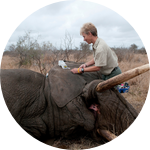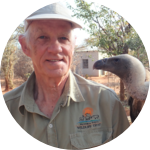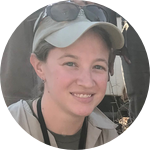About This Project
Botswana recently experienced severe, highly publicized mortality of elephant, which authorities attribute to a natural toxin. Neighboring northwest Zimbabwe, including Hwange National Park, has a similar climate and topography and holds the country’s largest elephant population. In the past, elephant have also died suddenly at waterholes in Hwange. This project aims to test seasonal waterholes for natural toxins to predict episodes of mortality and better manage this problem.
Ask the Scientists
Join The DiscussionWhat is the context of this research?
Zimbabwe and Botswana hold approximately 60% of remaining African savannah elephants. From March-May 2020 at least 350 elephant in Botswana died of a mysterious neurological condition attributed to a natural toxin. Most of these elephant died close to seasonal waterholes (pans). Similar, but fewer deaths have occurred close to pans in northwest Zimbabwe, but the animals are usually found too late to collect useful samples from the carcasses.
One hypothesis is that the ‘natural toxin’ may originate from harmful algal blooms (HABs) of cyanobacteria in the water in pans; also that elephant may have an unusual sensitivity to such a toxin. HABs occur in these pans because of the high organic content of the water deposited by elephant and other species that utilize this water source.
What is the significance of this project?
Finding toxins in these water bodies could provide clues on the emergence of this disease, which has the potential to threaten this critical population of an iconic African species. Zimbabwe and Botswana have limited financial and technical resources and neither country can do sophisticated analyses for natural environmental toxins: for wildlife and people. Sending samples for testing at international laboratories is almost impossible because of cost, import restrictions and the current COVID-19 pandemic.
This project would establish a relatively novel and simple diagnostic approach that is feasible in Zimbabwe and doesn’t require access to fresh carcasses. Such analysis should give a semi-quantitative assessment to authorities of whether pans are likely to prove lethal to elephant.
What are the goals of the project?
This project will set up PCR testing for genes coding for cyanobacterial toxins at the Victoria Falls Wildlife Trust Laboratory. Water and sediment samples will be collected in northwest Zimbabwe, both from pans continuously fed by borehole water and filled only by seasonal rains. At least 25 pans will be sampled during the dry season (October) and again after the rains (December/January). If available, fresh stomach contents of any elephant found dead close to such pans will be collected.
This analysis will determine if these genes are present in the pans and whether these is a difference between dry and wet season presence. Results will be correlated with the presence of elephant carcasses at the pans and also if deaths of fish, also seen in past seasons in Hwange, have occurred.
Budget
Sample collection
This will enable travel to seasonal waterholes (pans) in the target area to collect the necessary water and sediment samples from at least 25 such water-bodies on two separate occasions. It will also cover Parks fees and the cost of sample containers, cold storage and the transport to the Victoria Falls Wildlife Trust Laboratory.
PCR reagents
Includes construction and shipping of key PCR probes (primers), DNA extraction kits and tubes, mastermix. These are essential for the laboratory testing.
Endorsed by
 Project Timeline
Project Timeline
By 31st October, 2020 – collect dry, hot-season samples
By 30th November, 2020 – order and import essential reagents
By 31st January, 2021 – collect wet season samples
By 31st March, 2021 – complete analyses
By 31st May, 2021 – complete project report
Aug 31, 2020
Project Launched
Oct 31, 2020
Collect dry, hot-season samples
Nov 30, 2020
Order and import essential reagents
Jan 31, 2021
Collect wet season samples
Mar 31, 2021
Complete analyses
Meet the Team
Team Bio
The Victoria Falls Wildlife Trust Laboratory, completed in 2012, provides 'frontline' diagnostic, and later forensic, services for wildlife in the region, also for livestock, which is in contact with wildlife. Laboratory Technologist, Trish Pritchard, trained in South Africa, specializing in pathology. After working in the UK and South Africa, she joined the VFWT Laboratory, and has since undertaken courses in Molecular Biology, in which she has a keen interest.
Chris M Foggin
I am Zimbabwean, Wildlife Veterinarian who did my DPhil on the Epidemiology of Rabies and Rabies-related viruses in Zimbabwe, prior to establishing the Wildlife Veterinary Unit within the Zimbabwe Department of Veterinary Services, of which I was head for 22 years. Thereafter I joined the Victoria Falls Wildlife Trust as their wildlife veterinarian and laboratory director, from where I monitor the occurrence of wildlife disease in the area. I have worked extensively in the field, especially on veterinary management of rhino, and also directed the Malilangwe Course on Chemical and Physical Restraint of African Wildlife for over a decade. I have a special interest in diseases of free-ranging elephant.
Laura Rosen
I am a veterinary epidemiologist specializing in wildlife. I began working on wildlife health projects based in Africa as a vet student over 10 years ago and am passionate about contributing to wildlife conservation and One Health in southern Africa. Part of my PhD research on tuberculosis in wildlife brought me to Zimbabwe, where I studied working elephants in coordination with the Victoria Falls Wildlife Trust. I have been hooked since, continuing to volunteer with the Trust and even becoming registered as a vet in Zimbabwe. I am currently based in the US, working on animal health research in Africa and Ireland, and in light of COVID-19, I am also working with a state public health department on pandemic response.
Project Backers
- 92Backers
- 100%Funded
- $4,858Total Donations
- $52.80Average Donation




